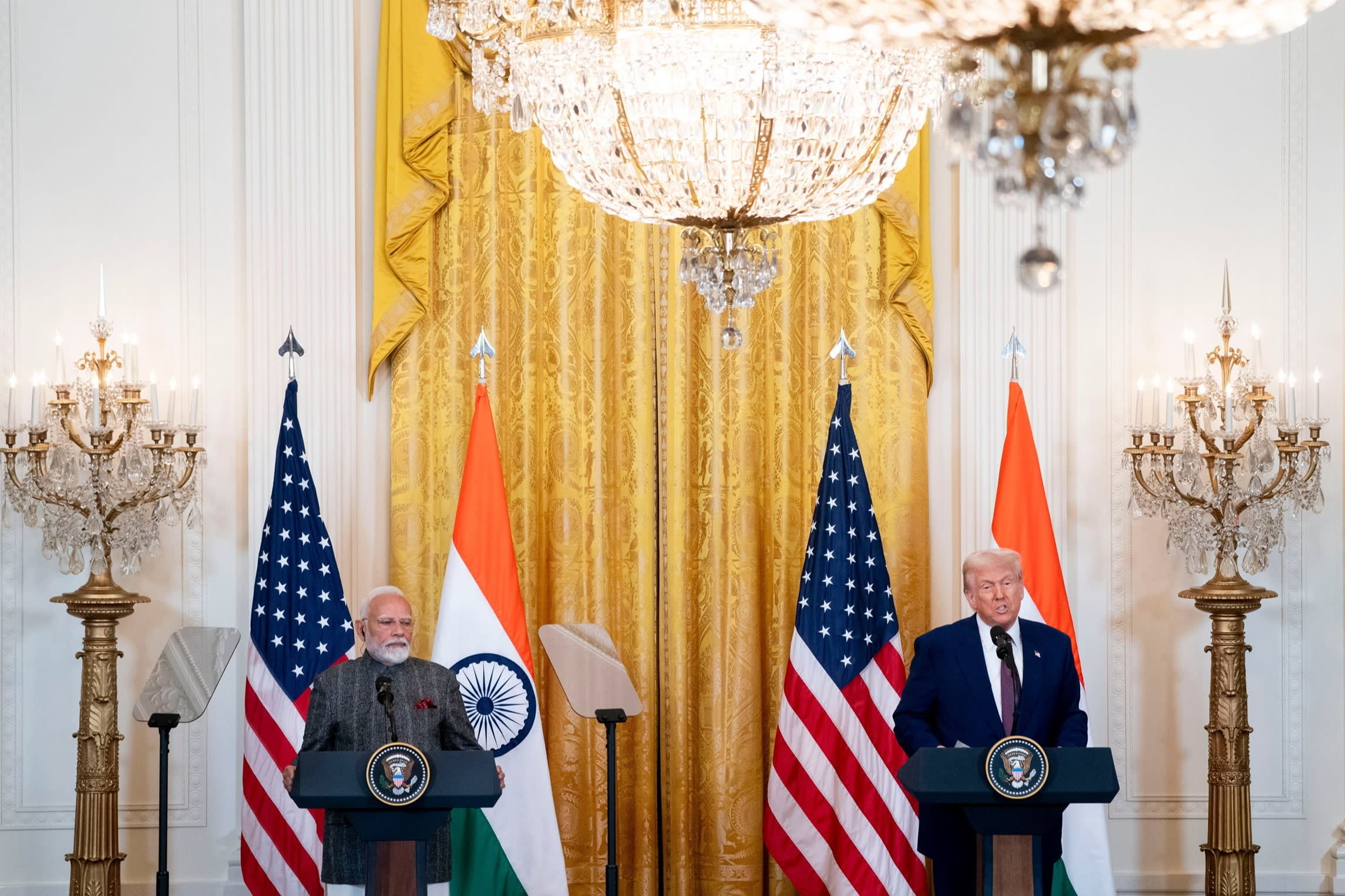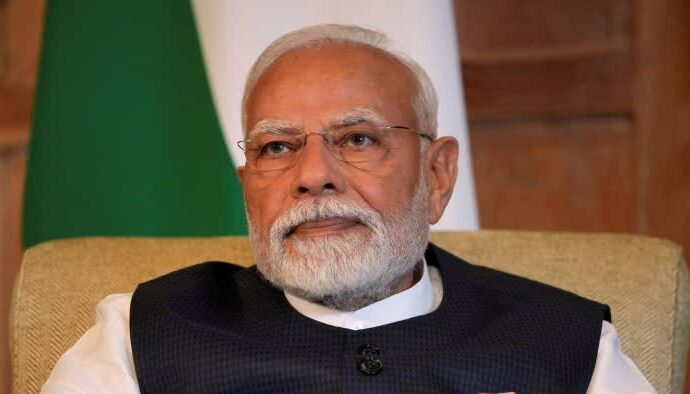Donald Trump has demanded India stop buying Vladimir Putin’s oil or face punishing tariffs. The problem for Prime Minister Narendra Modi is there may be no easy way to do it.
After years of his country bingeing on cheap Russian crude, India’s prime minister faces a geopolitical dilemma as well as a practical challenge should he seek to re-engineer the energy supply mix of the world’s third-biggest oil importer.
India buys about 90 per cent of its crude oil from overseas and has been the biggest market for Russian seaborne crude since 2023, according to ship tracking data compiled by Kpler. India imports about 5mn barrels of oil a day, of which 2mn come from Russia.
“Where would India find 2mn barrels a day of crude just like that?,” said Sumit Ritolia, a lead Kpler analyst. It could “pivot more towards non-Russian barrels. But I don’t think we’ll see a day when India stops buying Russian oil”.
In February, Trump and Modi, who the US president hailed as his “great friend”, agreed to increase US energy exports to India. Yet the distance between the countries — compared with much shorter shipping routes from Russia and the Middle East — and the technical challenge for Indian refineries of switching between different types of crude have limited that option.
“Replacing Russian barrels in full is no easy feat,” added Ritolia. “Gulf barrels come with pricing rigidity, African grades add freight volatility and Latin American flows face availability constraints.”
Trump has threatened to levy “substantially higher” tariffs on India than the 25 per cent rate he landed on last week, warning that it could be announced as soon as Wednesday.
“They are buying Russian oil, they are fuelling the Russian war machine and if they are going to do that then I am not going to be happy,” the US president told CNBC on Tuesday.
Modi has a difficult set of options: swallow the US tariffs, shift from Russian oil to other suppliers, or try to find a compromise with Trump, whereby India curtails Russian crude purchases without ceasing it altogether.
Shilan Shah at Capital Economics wrote in a note to clients that he doubted India would make “a wholehearted effort to wean itself off Russian oil” because Modi would be reluctant to upend cordial relations with Moscow or face criticism at home for appearing to capitulate to Trump.
The prime minister’s strongman image has also taken a hit domestically over Trump’s claim, rejected by New Delhi, to have mediated a ceasefire in a brief conflict between India and Pakistan in May.
The Kremlin has described US demands on India as “threats”.
“Attempts to pressure countries into cutting trade ties with Russia — we do not consider such statements legitimate,” Kremlin spokesperson Dmitry Peskov told reporters on Tuesday.

Trump’s pique marks a shift from the Biden administration, which made space for India’s oil trade with Russia, as long as it remained below the $60 a barrel G7 price cap. This aimed to keep global prices in check while limit Russian oil revenue.
Six months after Moscow’s full-scale invasion of Ukraine, India’s foreign minister S Jaishankar defended purchases of Russian oil, saying it was his “moral duty” to secure the “best deal” for Indian citizens.
A person involved in India’s oil sector said the country’s refineries operated by the book and that Russian oil had never been the direct subject of sanctions, unlike Iran and Venezuela. “India has been the most responsible international actor in this chain of events. We do not buy sanctioned oil,” the person said.
“The reason why India continues to buy is because there is no other choice,” the person added. “If India doesn’t buy from the world’s third-largest largest oil supplier, which produces 10 per cent of global production, then where are the alternate barrels going to come from?”
Although the steep discounts seen after the start of the Ukraine war have narrowed, the economics of Russian crude, which continues to trade at a steep discount, remain compelling, analysts said. That has provided a buffer for the Indian government to keep inflation in check, rein in the fiscal cost of fuel subsidies and maintain the profitability of its refineries.
A sudden halt of Indian purchases of Russian oil could also affect global markets. Premasish Das, head of analysis of oil markets in Asia at S&P Global Commodity Insights, said if India suddenly turned to other suppliers, it would create “a significant tightness into the market”, potentially pushing the price of crude to more than $80 a barrel, from current levels of about $67.
“While a complete disengagement from Russian crude remains unlikely in the near term,” Ritolia said, “India is prepared for gradual diversification — conditional on policy guidance from the government, market signals, and evolving risk premiums.”
India also exports about 1.4mn tonnes of refined oil a month — some of it containing cheaper Russian product — to destinations including Europe.
While much of that oil is produced by private Indian companies, including Reliance, analysts said New Delhi could mandate they switch to other crudes and restrict Russian oil for domestic consumption, which would protect domestic prices, and assuage concerns from some governments about buying product containing Russian oil.
Whether such a partial move would be accepted by private Indian refiners and enough to sway Trump remains unclear.
India purchases of Russian crude have already begun to fall. Kpler data shows Indian refiners’ July volumes of Russian oil dropped more than 500,000b/d from June to a five-month low of 1.58mn b/d.
Analysts noted that the July cargoes would have been ordered prior to Trump’s threats, in line with weaker seasonal demand during the South Asian monsoon.
While the drop is more pronounced among Indian state-run refiners, private operators, which account for more than 50 per cent of Russian crude intake, have begun reducing exposure, showing some diversification is under way, analysts said.
India’s intake of US crude has also grown to 225,000 b/d since May, nearly doubling, and with room for adding a further 100,000 b/d in the near term, according to Kpler.
A person familiar with the thinking at Reliance, India’s largest crude refiner that has been a big buyer of Russian oil since 2022, said the group would wait for direction from the Indian government, as it was a “geopolitical issue”.
“Coercing” India to stop importing Russian crude in the absence of a formal universal embargo would increase competition globally, warned DLN Sastri, director of oil refining and marketing at the Federation of Indian Petroleum Industry. “Oil will be available if you pay the price,” he said, but restricting India’s supplies will “affect bottom lines”.
Additional reporting by Tom Wilson in London


